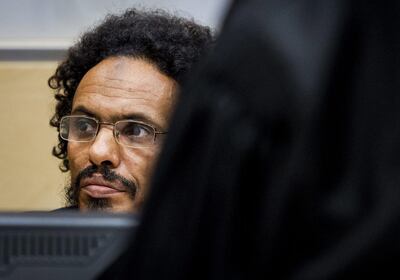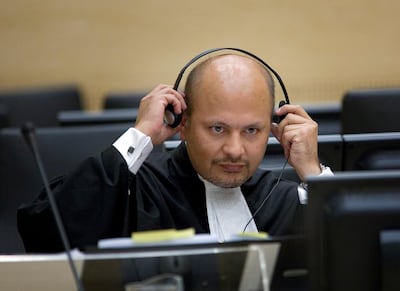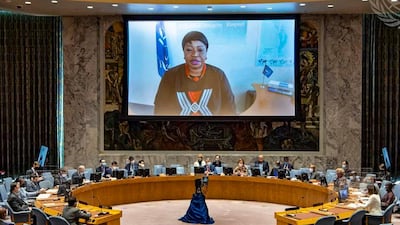Ten years feels like a lifetime ago. A great deal has transpired and changed over the tenure of Fatou Bensouda, who this week steps down as chief prosecutor of the International Criminal Court. The calm, collected and confident Ms Bensouda leaves the ICC at a critical juncture in its history and with a noteworthy legacy.
A decade ago, the ICC was a political and legal mess. Its previous chief prosecutor, Luis Moreno-Ocampo, had initiated many investigations into cases related to northern Uganda, Darfur, Kenya and the Democratic Republic of Congo. Under his helm, the prosecutor's office showed a penchant for targeting only one side of a conflict, with Kenya being a notable exception, albeit with no justice achieved. The gap between expectations of the ICC and what it actually delivered was cavernous.
While Mr Moreno-Ocampo talked a big game – for some too big – he managed few prosecutorial successes. Most of the perpetrators he targeted for prosecution evaded arrest, living openly and freely, and the core cases he built in the Kenyan situation subsequently collapsed due to a lethal combination of poor case construction and witness intimidation. Politically, Mr Moreno-Ocampo left the ICC amidst stinging rebukes from African states as well as affected populations who claimed the Court was biased against them.
When she was elected by the ICC's member states to become the Court's second-ever prosecutor in 2011, Ms Bensouda heralded both continuity and change. She had been Mr Moreno-Ocampo's deputy, but her style was nothing like that of her former boss. At the time, the law professor Kevin Jon Heller praised Ms Bensouda, stating: "She's brilliant, tough, fair, and the reason that the OTP [office of the prosecutor] has not collapsed under the weight of Moreno-Ocampo's incompetence. She's also inspiring, having broken though every glass ceiling imaginable in Gambia."
Ms Bensouda’s tenure was defined by her quiet and calm resolve. There were no untimely outbursts. Despite the high-stakes game of international criminal law, her personality generated no unnecessarily dramatic moments. Controversies over her history were kept largely at bay, including her tenure as justice minister in former Gambian dictator Yahya Jammeh's cabinet and efforts among officials to avoid asking her to testify at the Truth, Reconciliation and Reparations Commission.
Some major controversies likewise subsided during her time in the ICC.
While her candidacy to become chief prosecutor enjoyed the backing of the African Union, by the middle of her term, anti-ICC agitation among African states reached a crescendo. Following a visit by then Sudanese president Omar Al Bashir to South Africa in violation of an outstanding ICC warrant against him, three states – Gambia, South Africa and Burundi – initiated proceedings to withdraw from the Court. Leaders, including Kenyan President Uhuru Kenyatta, who was facing prosecution at the ICC, derided the Court and called it a plaything of western imperial powers.
But just a few years later – and following the collapse of the cases against Mr Kenyatta and his deputy, William Ruto – the relationship between the ICC and African communities and states has mellowed dramatically. Ultimately, only Burundi withdrew its membership from the Court, even as the situation there remains under investigation. South Africa and post-Jammeh Gambia have since reiterated their support for the ICC.

During her tenure, Ms Bensouda had some notable victories in the courtroom, including the conviction of former Ugandan child soldier-turned-rebel commander Dominic Ongwen, former militia leader Bosco Ntaganda over atrocities in eastern Democratic Republic of Congo, and Ahmad Al Mahdi for the destruction of culturally protected properties in Mali.
Despite promises from her office to do otherwise, however, Ms Bensouda could not put a dent into the ICC’s asymmetrical approach to justice. No government officials in Uganda or the Democratic Republic of Congo were targeted for prosecution during her tenure, despite ongoing allegations of atrocities committed by both. In Ivory Coast, the Court only pursued the losing side of the 2011 conflict. With respect to the 2011 uprising and civil war in Libya, warrants have only been issued to members of Muammar Qaddafi's regime.
Some political controversies gained fever pitch under Ms Bensouda's tenure. The US has historically had an up-and-down and largely ambivalent approach towards the ICC. Under former president Donald Trump, however, it went into aggressive, vitriolic overdrive. No US administration has ever accepted that the Court could investigate American personnel in Afghanistan (or anywhere) or investigate alleged war crimes in Palestine. But Mr Trump, alongside his two anti-ICC lieutenants, then secretary of state Mike Pompeo and national security adviser John Bolton, waged a co-ordinated attack on the ICC, deriding it as a "Kangaroo court" and issuing sanctions against Ms Bensouda and her colleague Phakiso Mochocho.
Ms Bensouda calmly guided her office through these attacks. No one would blame her if she ever lost composure. But she didn’t. Instead, she met the frothy venom spewed towards her with an undeterred sense of resilient composure, pressing ahead with investigations into both Afghanistan and Palestine, and outlasting the Trump administration's tenure.

The greatest legacy that Ms Bensouda leaves behind is her willingness to look at the alleged atrocities of major powers, such as Russia and the US, despite the onslaught of coercion and criticism she faced, including from proponents of the ICC who felt she should pull her punches. She thus leaves her successor, Karim Khan, with the difficult task of figuring out how to manoeuvre and prioritise investigations into Palestine, Afghanistan, Georgia and the ethnic cleansing of the Rohingya in Myanmar on a tight – and ever-tightening – budget.
On the horizon are also potential investigations into Ukraine, Nigeria and the Philippines. Even though Ms Bensouda eventually decided not to pursue an investigation into alleged crimes committed by UK military forces in Iraq, few had previously believed that an international organisation – let alone a criminal court – would even dare to confront the excesses and abuses of major powers. But the ICC did so under Ms Bensouda.
Her tenure was far from perfect, but Ms Bensouda's achievements are remarkable. She guided a highly imperfect ICC through tumultuous times while lending the institution a calm and confident demeanour through successive political and legal challenges.
Ms Bensouda helped the Court punch above its weight. It will now be up to Mr Khan to make sure those punches land.
Mark Kersten is an expert in international law and a consultant at the Wayamo Foundation



